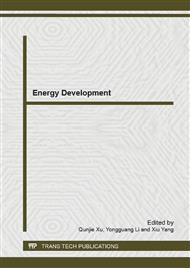p.696
p.700
p.704
p.709
p.715
p.720
p.724
p.728
p.733
Co-Benefit Analysis on Fuel-Switching Project for District Heating
Abstract:
Various pollutants emitted by coal-fired boilers are one of the main culprits of fog and haze forming in recent years especially in the north of China. The paper analyzes the fuel-switching project for district heating and main pollutant reductions, emission reductions of atmospheric particulate matter are calculated by materials accounting method. The economic, environmental and social benefits are also calculated according to pollutant reductions. It is shown that clean energy can be used for district heating. The project provides the theoretical basis for coal fired to gas fired reforming for district heating in the north area and has a guiding role for the other areas of China.
Info:
Periodical:
Pages:
715-719
Citation:
Online since:
December 2013
Authors:
Price:
Сopyright:
© 2014 Trans Tech Publications Ltd. All Rights Reserved
Share:
Citation:


